| Srl | Item |
| 1 |
ID:
140386
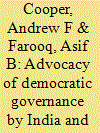

|
|
|
|
|
| Summary/Abstract |
This article examines the patterns of consistency and inconsistency between how India and China advocate democratisation at the global and national levels. Addressing this question through a dualistic framework, we develop a detailed map of the rhetorical promotion of democratic governance by India and China through an analysis of 10 years of foreign affairs speeches, remarks, interviews and statements of political elites of both countries. The article argues that although China has not shied away from declarations on democracy domestically as well as on global governance, the contradictions between the clear and consistent push for democracy and equity at the global level and the highly contingent commitment to democracy at the national level remain highly salient. India’s deficiencies, by way of contrast, come not in the domain of legitimacy but effectiveness. India’s struggle to translate its domestic democratic credibility into more equitable representation at the global institutional level and into a stellar economic model at the domestic level exposes it to criticism in relationship to China. Yet, even with these gaps, the article concludes that India has some comparative advantages over China precisely because it can play a consistent two-level game in terms of the promotion of democracy both at global and state levels.
|
|
|
|
|
|
|
|
|
|
|
|
|
|
|
|
| 2 |
ID:
118607
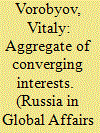

|
|
|
|
|
| Publication |
2012.
|
| Summary/Abstract |
As the center of gravity in global development shifts towards the Asia-Pacific region, the political significance of Central Asia as Eurasia's geopolitical core increases. China's rapidly evolving cooperation with this region becomes increasingly tight. But what interests lie behind this process? And how lasting can such cooperation be?
|
|
|
|
|
|
|
|
|
|
|
|
|
|
|
|
| 3 |
ID:
164059
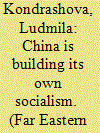

|
|
|
|
|
| Summary/Abstract |
The revolution of 1949 in China marked the country’s transitionfrom “bureaucratic feudalism” to the building of socialist society. The begin-ning of the policy of reforms (1978-1979) is now interpreted as “another rev-olution” – a transition from “state socialism” to “market socialism.” Judgingby the decisions of the 19th CPC Сongress, at present China begins a newstage of socioeconomic development aimed at combining the personal inter-ests of its citizens with public and state interests. The new stage of reforms canbe characterized as the “third Chinese revolution” with very important conse-quences for the entire social structure of the country. The Chinese multilayeredmarket economy will correspond to a mixed political system that features acombination of strong centralized power with party-and-government manage-ment and democratic methods of administration at a lower level.
|
|
|
|
|
|
|
|
|
|
|
|
|
|
|
|
| 4 |
ID:
137782


|
|
|
|
|
| Summary/Abstract |
Despite extensive economic ties and political engagement throughout Asia and sizable investment in some of the region's most vulnerable regimes, China has yet to develop a stable of devoted client states. This article argues that both strategic and normative factors militate against China's cultivation of strong patron–client pacts. The article then uses the case of Cambodia to illustrate these arguments, analyzing how that partnership has developed and its important limitations.
|
|
|
|
|
|
|
|
|
|
|
|
|
|
|
|
| 5 |
ID:
139561
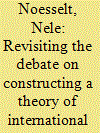

|
|
|
|
|
| Summary/Abstract |
After decades of policy learning and adoption of “Western” theories of international politics, the Chinese academic community has (re-)turned to the construction of a “Chinese” theory framework. This article examines the recent academic debates on theory with “Chinese characteristics” and sheds light on their historical and philosophical foundations. It argues that the search for a “Chinese” paradigm of international relations theory is part of China's quest for national identity and global status. As can be concluded from the analysis of these debates, “Chinese” theories of international politics are expected to fulfil two general functions – to safeguard China's national interests and to legitimize the one-party system.
|
|
|
|
|
|
|
|
|
|
|
|
|
|
|
|
| 6 |
ID:
119236
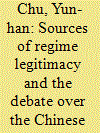

|
|
|